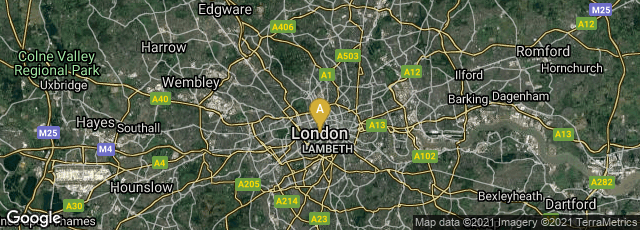

A: London, England, United Kingdom
The first English book on “library economy,” or library management, was a series of letters that Scottish minister and writer, John Dury, Keeper of the Royal Library from the death of Charles I until the Restoration, wrote on library and educational reform to his friend, the German-British polymath and educational reformer Samuel Hartlib. Hartlib published them in London as The Reformed Librarie Keeper in 1650.
"One of the ways in which both Dury and Hartlib wished to promote educational reform and further knowledge was by exploiting the facilities of public libraries in London, Oxford, and Cambridge more efficiently. Dury expressed the hope that the work of the librarian might be as ‘a factor and trader for helpes to learning, a treasurer to keep them and a dispenser to apply them to use, or to see them well used, or at least not abused’ (Turnbull, p.257). The Reformed Librarie-Keeper printed various proposals for the organization and use of libraries, which Dury had originally advanced in 1646. It was published together with Dury’s plans for a reformed school in 1650. In that year, Dury was appointed keeper of the library of St James’s Palace (formerly the King’s Library), which was in a state of disorder. He installed new bookcases and urged that the trustees for the selling of the late king’s goods should draw up an inventory of the books and medals, both measures being intended to make the library usable to the public. A few years later, Dury and Henry Langley unsuccessfully proposed Hartlib for the post of Bodley’s Librarian.
"As storehouses of learning, in which great strides had already been made to establish accurate classifications, libraries had the potential to be ideal embodiments of the Ark. But the poorly-funded libraries of interregnum England were too chaotic in organization and too inaccessible for ordinary readers to be able to fulfil the role in which Dury and Hartlib had cast them" (Museum of the History of Science, Oxford, "Hartlib Circle," http://www.mhs.ox.ac.uk/gatt/catalog.php?num=67, accessed 01-30-2012).
"In Dury's first letter we learn that the library keeper's only responsibility was to safeguard the collection. To do this, a man (note: not a woman) did not need to be particularly well educated. The pay was low, commensurate with the skill-level required for the job. Dury describes the service provided by "factors and traders," educated men who profited by traveling throughout Europe searching for books suitable for various collections. Dury faults that system because he believed that the "factors and traders" were more interested in profit-making than in learning. (He then kindly defends these men by pointing out that, after all, they have to make a living.) His idea was to enhance the job of the library-keeper to include the role of the trader. In order to do this, the position of library-keeper would have to provide enough pay to attract educated men. If the library wanted men who were broadly educated and interested in the advancement of learning, Dury suggested the pay scale, which then ranged between 50 and 100 Pounds a year, be raised to 200 Pounds. He recommended that potential employees be tested in order to prove they are familiar enough with the various disciplines of the day to accurately maintain the library catalog.
"Dury felt that having trained library keepers was essential if libraries were to be made open to the public. The library-keeper's job would be extended to include recommending and annually defending additions to the collection before the faculty of the University. The library-keeper was to correspond with experts in every science throughout Europe (expenses to be paid by the University). The library keeper was also to be the reference person regarding the collection, in order to assist scholars. In addition he was to continue the role of safeguarding the collection, which, in a public library, meant overseeing collection use and maintaining the library catalog.
"Dury notes that the catalog would need to be created first, however. He suggested that the catalog be arranged by subject matter, then divided by language. The catalog he had in mind would also contain a pointer to the physical position of the book within the library. That system would be designed well enough to allow for the growth of the collection. Moreover, an annual list of additions to the collection would be printed. The entire catalog would be printed and circulated to other libraries in Europe every three years (or more often if the library grows faster than expected). He also proposed that the University keep books that the library has acquired, by gifts or purchase, even if the faculty couldn't use them, as; "there is seldom any book that does not contain something useful." He suggested keeping them in a separate collection and creating a list that was indexed by subject and arranged alphabetically by author.
"Dury's second letter offers an argument to be used in defending the cost of establishing his proposed library before the British Parliament, which he thought should supply the necessary funding. He bases his argument on Christian moral grounds, reminding us that in his day the separation of church and state was not a popular idea. Dury saw the library as a place that would nourish the spirits of men. He criticizes private libraries as serving those that "pride themselves in the possession of that which others have not," men who "covetously obstruct the fountains of life and comfort." He complains that this "dilates the light of knowledge and the love of the grace and goodness in the hearts of all men." He argues that library should be "communicating all good things freely to others." He goes on to argue that the university library, by proving useful to scholars in other nations, would encourage them to adopt similar policies for their own libraries, thus bringing honor to England. Finally, he warns that if the library is administered without relation to Christ's teachings, the endeavor is likely to lead to strife, confusion, and pride"(http://people.lis.illinois.edu/~chip/projects/timeline/1651robins.html, accessed 01-30-2012).
(This entry was last revised on 03-16-2014.)